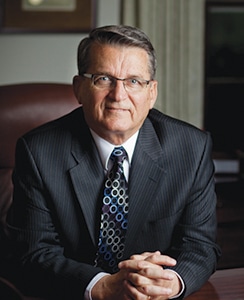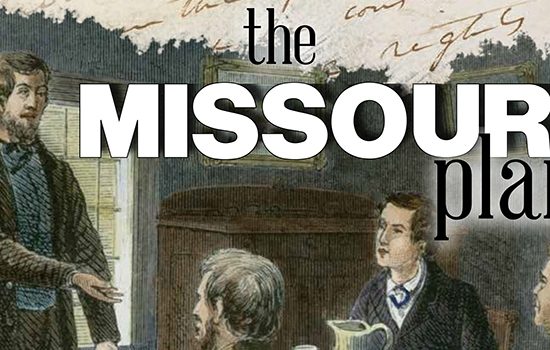Nearly 100 years after the end of the Missouri Plan of dual alignment, some Baptists today hope to see more of the spirit of Baptist cooperation. Jerry Cain, chancellor of Judson University (an American Baptist school in Illinois), loves the history of the Missouri Plan and views it as an inspiring model for future Baptist work.
“How can we be just Baptists again, without an adjective, like we were in those years after the Civil War?” Cain wonders. “I think we set a mark for the whole Baptist world. They kind of admired Missourians.
 Jerry Cain“I would like to see a new spirit in Baptist life that would be inclusive and cooperative and encouraged Baptists-ness rather than the adjective in front of the word Baptist,” he added. “Missouri set that pattern after the Civil War and evidently did it quite successfully. It’s not easy but we had a different kind of Baptist-ness then. And I think Baptists need that again rather than fracturing into smaller groups with more adjectives. There ought to be more ways to celebrate Baptist-ness beyond our adjectives.”
Jerry Cain“I would like to see a new spirit in Baptist life that would be inclusive and cooperative and encouraged Baptists-ness rather than the adjective in front of the word Baptist,” he added. “Missouri set that pattern after the Civil War and evidently did it quite successfully. It’s not easy but we had a different kind of Baptist-ness then. And I think Baptists need that again rather than fracturing into smaller groups with more adjectives. There ought to be more ways to celebrate Baptist-ness beyond our adjectives.”
Cain noted that he learned to “walk both sides of the street” when he worked at William Jewell College in Missouri before heading to Judson. William Jewell has maintained a bit of the Missouri Plan spirit as it often alternates presidents with backgrounds from Southern and American Baptist life. Cain thinks this renewed spirit of Baptist cooperation could revive Baptist work and witness.
“Right now we’re probably a little bit ashamed to be Baptists because of our divisiveness and our exclusion of folks,” he explained. “I would like for us to once again be proud of being Baptist and know what it means to be a Baptist and be proud of our history and what we brought to this culture. From Roger Williams to Martin Luther King Jr., they’re Baptists. We need to remember our history and what we brought to this country — and that we can do it again in the future.”
Cain suggested one practical step might be cooperation on a shared conference. In particular, he sees the annual fall adult retreat at Windermere Baptist Conference Center as a step. Last year’s cosponsors included Area IV of the American Baptist Churches of the Great Rivers Region, Cooperative Baptist Fellowship Heartland, Churchnet, The Baptist Home and Missouri Baptist Foundation.
“Let’s just pick one conference that we can all agree on and work together to put a public face on Baptist-ness,” he said. “If we had one really good adult conference it would be better than five little bitty anemic conferences.”
North American Baptists
Since the time the Missouri Plan started, efforts have emerged to bring Baptists together across denominational lines. Shortly before the Missouri Plan ended, the Baptist World Alliance (BWA) was founded to unite Baptists around the world. Nearly a half century after the end of the Missouri Plan, a regional BWA group — the North American Baptist Fellowship (NABF) — was created to build stronger ties between the United States and Canada. The BWA and NABF today include American Baptist Churches, USA, Churchnet, Cooperative Baptist Fellowship and many Southern Baptists.
 George BullardGeorge Bullard, general secretary of the NABF, said the group exists “to support the Baptist World Alliance and its strategic initiatives” and “to create collaboration opportunities among member bodies.” He believes the NABF “could model for the world how Baptists can better collaborate with one another.”
George BullardGeorge Bullard, general secretary of the NABF, said the group exists “to support the Baptist World Alliance and its strategic initiatives” and “to create collaboration opportunities among member bodies.” He believes the NABF “could model for the world how Baptists can better collaborate with one another.”
“NABF is already collaborating around disaster response,” he said. “While there has been dialogue in recent years around other issues of possible collaboration and some cooperation among member bodies, none have risen to the level of true sustainable collaboration. I would hope there would be additional areas of collaboration due to the synergy this can create and the increased capacities that would be realized.”
The NABF, which celebrated its 50th anniversary in 2014, has usually maintained a low profile, but Bullard hopes the NABF could embrace a larger role. He acknowledged many Baptist bodies are struggling with finances and other issues, but he hopes there can be greater appreciation of “the beauty of collaboration among Baptists in North America.” He noted that what Baptists particularly need is “a commitment to collaboration that is truly collaboration.”
“Too often the word ‘collaboration’ is used when what is really going on is ‘cooperation’ or ‘coordination’ of certain limited efforts,” he explained. “Collaboration involves not doing ministry one denomination’s way or another denomination’s way, but discovering new higher ground for a synergy of efforts that have a greater impact together than can occur separately.”
“While there are real theological differences among our member bodies, there are so many areas of potential collaboration,” he added. “In addition to disaster response and human trafficking, there would also be economic oppression, religious liberty, church planting, renewal of existing congregations and discovery of authentic tactics for evangelism in a post-church and post-Christian world.”
 Jim HillJim Hill, executive director of Churchnet, agrees with Bullard about the potential for greater collaboration. The president of the NABF for the past four years, Hill said “it has been a wonderful privilege to fellowship with and learn from Baptists from across North America and from a wide variety of Baptist traditions and denominations.”
Jim HillJim Hill, executive director of Churchnet, agrees with Bullard about the potential for greater collaboration. The president of the NABF for the past four years, Hill said “it has been a wonderful privilege to fellowship with and learn from Baptists from across North America and from a wide variety of Baptist traditions and denominations.”
“I have often felt that in many ways our autonomy and the resulting divisions have robbed us the strength and gifts that come from our diversity,” he explained. “I have joked with my National Baptist friends that I am confident I would have been a better preacher if I had had the privilege of worshipping with one of their choirs throughout my ministry. Each of our traditions brings a richness and uniqueness to our understanding of the gospel and our ministries.”
“There is tremendous potential within our efforts to build relationships and collaboration for the sake of God’s kingdom,” he added. “It is not always easy, but it is worth the effort.”
See also:
Missouri once offered unique model for Baptist cooperation
Revive the spirit of the Missouri Plan Revive the spirit of the Missouri Plan


